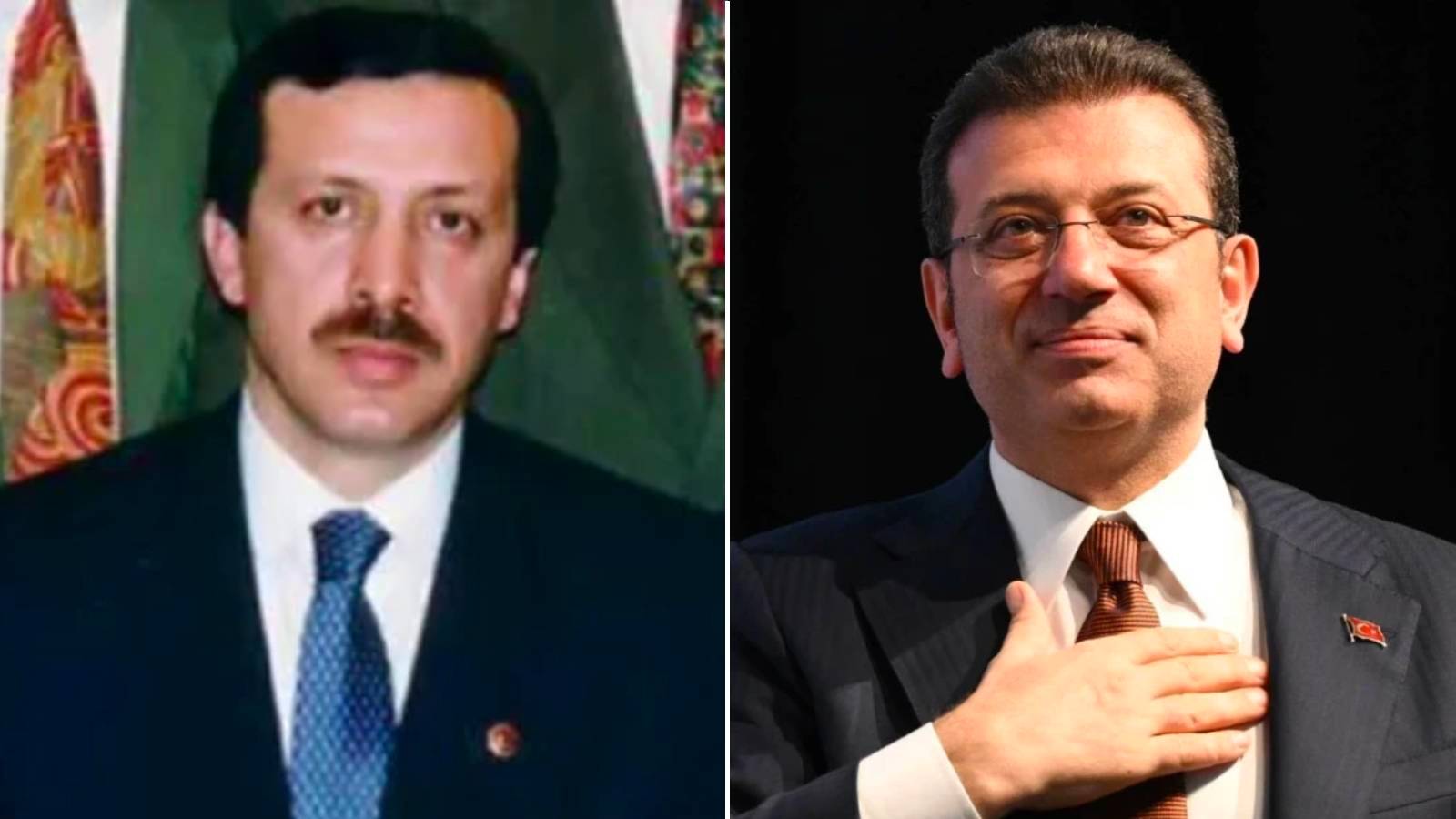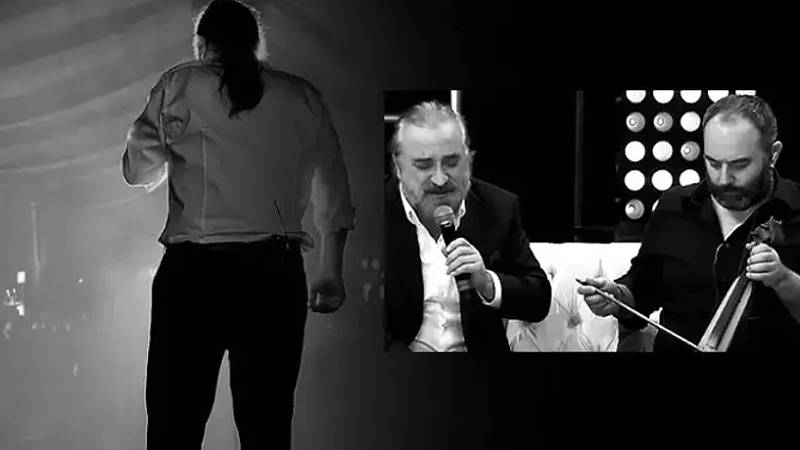(Görüntülü) Silivri'de deniz kahverengi oldu, balıkçı tekneleri zarar gördü
İstanbul DHA - SİLİVRİ'de deniz sağanak yağış ve lodosun ardından kahverengiye büründü
11 Ocak 2019 16:48
16 Aralık 2013 02:03
Hazal Özvarış
“18 Ağustos 1992.
Dokuz yaşındaydım o zaman. Dört gün, dört gece ateş altında kalmıştı Şırnak. Sığınağı olmayan evlerde, insanlar evleri hedef alan havan topu saldırılarından korunmak için evlerinin zeminini balyozla kırıp alt katlara inmeye çalışıyorlardı.
Bizim de evin damının bir kısmını koparıp almıştı havan topu. Şansımız var ki evimizde bir arada olmak için toplaştığımız yere gelmemişti. Sesten o kadar korkmuştuk ki, altımıza kaçırmıştık. Hedef olmak istemediğimizden dolayı hiç ışık kullanamıyorduk. Annem yataktaki idrarı kan sanmıştı. Annemin korkudan takırdayan dişlerinin hâlâ sesini hatırlarım. Neyse ki babam el feneri ile durumumuzu görüp, annemi rahatlatmıştı.
O günden sonra bizim dâhil Şırnak merkezde hemen her evin altına bir sığınak yapılmıştır. O günlerde bir sığınağımız ya da bodrum katı benzeri bir şeyimiz olmadığı için 100 metre ötedeki komşumuzun evine koşmuştuk. Onların da sığınağı değil, evlerinin altındaki ahırları vardı. Bizim gibi birkaç aile daha, dört gün boyunca koyun ve ineklerle aynı yerde yaşadık.” (Bianet, 19 Ağustos 2013)
Bu söyleşi, uzunca bir "giriş" bölümü için sabır gerektiriyor.
Yukarıdaki alıntı, 1991’de il olduktan sonra Şırnak’ın tarihine geçecek katliamların ilkine tanıklık eden avukat Ramazan Demir'e ait. 18 Ağustos 1992’de başlayan ve bugün bile tam olarak kaç insanın ölümüne sebep olduğu kesin olarak bilinmeyen bu katliamın ardından yapılan resmi açıklama ve bazı haberler kısaca şöyle:
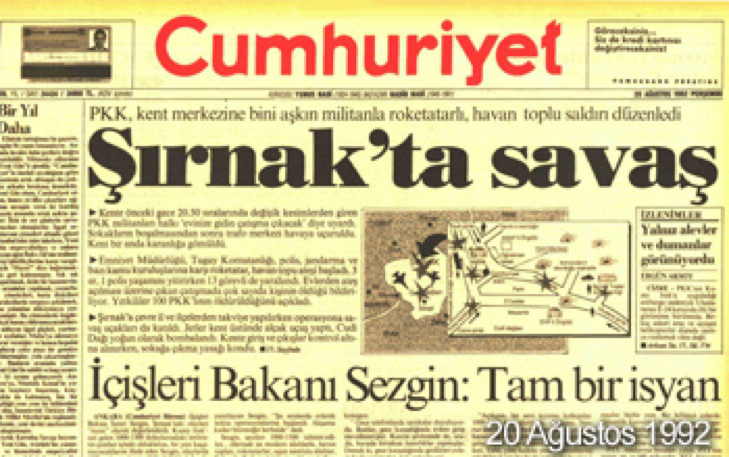
20 Ağustos’ta sekiz sütuna manşet yapılan “Şırnak’ta savaş” başlığıyla çıkan Cumhuriyet:
“PKK, kent merkezine bini aşkın militanla roketatarlı, havan toplu saldırı düzenledi. Emniyet Müdürlüğü, Tugay Komutanlığı, polis, jandarma ve bazı kamu kuruluşlarına karşı roketatar, havan topu ateşi başladı. Şırnak’a çevre il ve ilçelerden takviye yapılırken operasyona savaş uçakları da katıldı. Kente giriş ve çıkışlar kontrol altına alınırken, sokağa çıkma yasağı kondu.”
Dönemin İçişleri Bakanı İsmet Sezgin:
“Bir nevi kıyıma kalkıştılar. 1000-1500 kişi, silahlarla… Tam anlamıyla bir isyan hareketi. (…) Tümüyle çember içerisindedirler. Kaçamazlar bir yere. Bir bölümü evlerde. Güvelik kuvvetleri bu yüzden nokta operasyonuna başladılar.”
Dönemin Başbakanı Süleyman Demirel:
“Çocuk, kadın ve masum vatandaşların ateşin arasında kalmaması için itinalı davranmak şart. Bütün bu yapılanlar akla hayale sığmayan çılgınlıktır. (…) PKK sönüp gidecek, başka yolu yok.”
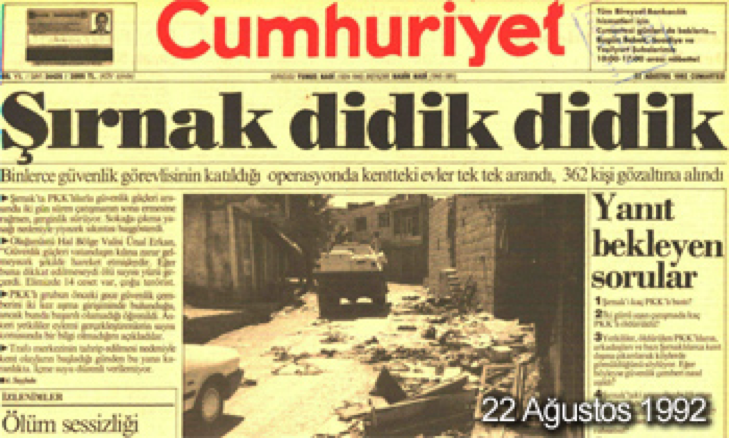
Ancak "savaş" denilecek ölçüde bir saldırıya ve ardından İçişleri Bakanı Sezgin’in bahsettiği çembere rağmen yakalanan hiçbir PKK’lı yoktu. Üstelik Demirel’in “sivillere karşı itina” söylemine rağmen çok sayıda sivil ölmüştü. Yapılan “didik didik” aramada bulunan silahlar, bir bölümü kalaşnikof olmak üzere bazı tüfekler ve tabancalarla sınırlı kalmıştı. Olayın ardından gazeteciler Şırnak'a sokulmadı, sokulduklarında onlara polis “eşlik etti”, görünmesini istenmeyen yerlerin fotoğraflarının çekilmesi engellendi, konuşması istenmeyen isimlerle görüşmeler önlendi.
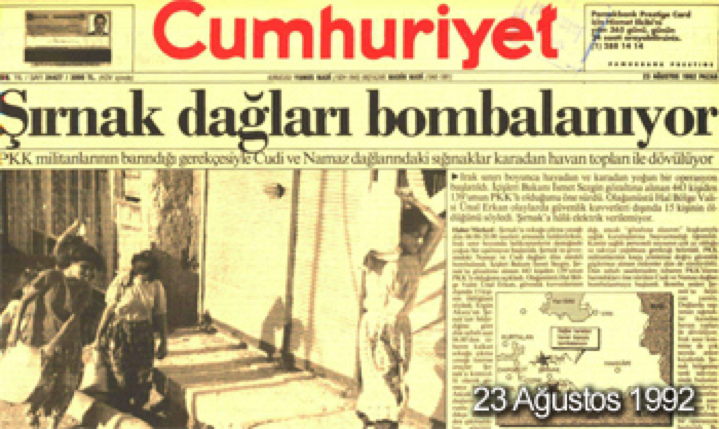
Şırnaklılar kente sızabilen gazetecilere güvenlik güçlerini işaret ederken, inceleme yapan Halkın Emek Partisi (HEP) mensubu milletvekilleri hazırladıkları raporlarda bölgede bulunan mermi kovanlarının, devletin resmi silah üreticisi kuruma, yani Makine ve Kimya Endüstrisi’ne (MKE) ait olduğunu açıkladı.
Bu tabloya rağmen değişen bir şey olmadı. Bir kez daha, insan hayatının hesabını soran bir dava açılmadı.
Ardından 14 Haziran 1993’te altı sivil Şırnak’a bağlı Görümlü’de öldürüldü. 26 Mart 1994’te Şırnak'ın Koçağılı ve Kuşkonar köylerinde 38 kişi, 15 Ocak 1996’daki Güçlükonak katliamında da 11 kişi öldürüldü. İki katliam hakkında açılan davalar Avrupa İnsan Mahkemesi’ne (AİHM) taşındı ve Türkiye mahkûm edildi.
Asker ve hükümet ile bazı sivil ve askeri savcıların "PKK saldırısı" diye üzerini kapatmaya çalıştıkları Koçağılı ve Kuşkonar'daki 38 köylüyü katledenin, yaklaşık 20 yıl boyunca olay günü bölgede uçuş yapmadığını öne süren Türk Hava Kuvvetleri'ne ait savaş uçaklarından atılan bombalar olduğu, Genelkurmay Başkanlığı kaynaklı belgelerle ortaya çıkarıldı.
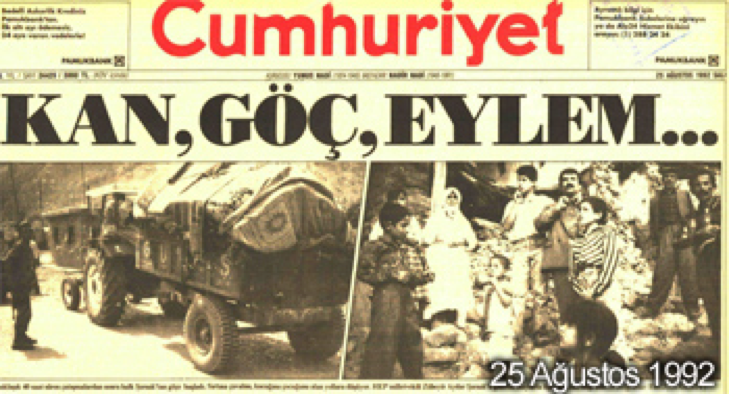
Peki, daha sonraki Şırnak katliamlarının öncüsü 18 Ağustos 1992'de başlayan saldırıların ardında yatan gerçek neydi? Bu olay da, Kuşkonar ve Koçağılı katliamından sonra yapıldığı gibi, "PKK saldırısı" iddiasıyla kapatılmak mı istenmişti?
O günlerde neler olduğunu öğrenmek için dönemin Şırnak Valisi Mustafa Malay’a ulaştık. Ankara Üniversitesi Siyasal Bilgiler Fakültesi ve Polis Akademisi mezunu Malay, kıdemli bir bürokrat. Malatya'da doğan ve beş yaşında babasını kaybettikten sonra yoksulluk içinde tahsilini tamamlayan Malay, Ocak 2013’te İstanbul Merkez Valiliği görevinden emekli olmadan önce sırasıyla Şırnak, Ordu, Erzurum ve Aydın valilikleri görevinde bulundu. Görev yaptığı yerlerde "halka yakın bir bürokrat" olarak bilinen Malay'a, 1992 Şırnak olaylarına ilişkin sorular yönelttik; askeri vesayetin yerelden merkeze, askerden sivile uzanan menziline ilişkin önemli kayıtlar düşen cevaplar aldık. Buyrun...
‘Şırnak’ta asker ne halktan bir sigara almıştır, ne yemeğini yemiştir’
- 40 yıl devlete hizmet etmiş bir isim olarak...
47 yıl. Ben polis memurluğundan başladım. Komiserlik, emniyetten sonra önce kaymakam oldum, kaymakamlıktan sonra tekrar emniyete geçtim. 1980'li yıllarda İstanbul'da istihbarat ve siyasi şube müdürlüğü yaptım. Sonrasında yeniden eski mesleğe döndüm ve müfettiş oldum. 9 sene müfettişlik yaptım, sonra yurt dışına gittim, 6 ay orada kaldım. Ve ilk valiliğim 1991-1993 yıllarında oldu, Şırnak'ta.
- Şırnak da yeni il olmuştu.
Ve çok sıkıntılı bir dönemdi. Ama ben vatandaşlar arasında hiçbir ayrım yapmadım. Vatandaş bizi sevdi, biz onları sevdik. Gittiğim zaman beni çok güzel karşılıyorlar. Ondan sonra Ordu, Erzurum, Aydın valilikleri ve İstanbul'da merkez valileri grup başkanlığı yaptım. Sonra da yaş haddinden emekli oldum.
'Askeri biraz tedirgin ettim'
- 47 yıllık emniyet ve mülki idare amirliği deneyiminizde askeri vesayete dair tanıklıklarınızı merak ediyoruz. Özellikle 1990'lı yıllarda sembol illerden Şırnak'taki deneyiminiz hakkında, yıllar sonra Şırnak'a yaptığınız ziyarette şunları söylüyorsunuz: "Valilik yaptığım dönemde burası karmaşıktı. Hem asayiş olarak, hem vatandaşlarımız büyük ızdırap çekiyordu." Bu ızdıraplarda askeri vesayet nasıl bir rol oynuyordu?
Askerler pek halkın içine inmiyordu. Gerek astsubayların, gerek subayların, hiçbirisinin halkın içine inip halkla selamlaştıklarını, merhabalaştıklarını görmedim. Onun için bu yönüyle onları biraz tedirgin ettim. Dedim ki "Siz de halkın içine inin, halkla bir araya gelin." Hiçbirisi ne halktan bir sigara almıştır, ne yemeğini yemiştir. Kendi hallerinde kalmışlardır. Ama ben devamlı halkın içindeydim. Her tarafa giderdim, halkla iç içe olurdum.
‘1993’te Mardin sınırına kadar beni konvoyla uğurladılar’
- Bu nedenle mi Şırnaklıların en kötü zamanlarda bile iyi andığı bir isim oldunuz?
Bize "Sakın ola ki kaymakamlık yaptığınız yerlere gitmeyin" derlerdi. "Niye" diye sorunca "Ola ki vatandaşlar sizin yüzünüze bakmaz, o zaman perişan olursunuz. Görev yaptığınız hiçbir yere gitmeyin" dediler. Ben tam aksini yaptım. Nerede kaymakamlık yaptıysam oraya gittim. Ben hâlâ Şırnak'a gidiyorum... Şırnak'tan beni merkeze aldılar, kendim isteyerek de gittim merkeze. (Merkez Valiliği "kızak görev" olarak biliniyor/T24) Merkeze giderken benim müdürüm aradı ve dedi ki "Sayın Valim, halk buraya toplandı. Sizi bekliyorlar." Ben de "Sen onlara de ki biraz sonra gelecek. Ama kesinlikle beni peşimden takip etmesinler" dedim. Sonra gittim, halka bir konuşma yaptım; "Size daha iyi hizmetler vermeyi çok arzu ederdim. Ama verdiğim hizmetlerden siz de memnunsunuz, ben de. Şimdi aranızdan ayrılıyorum." O zaman insanlar korkularından akrabalarını bile ziyaret edemezlerdi.
O gün oraya dünya kadar insan geldi ve ben onlarla vedalaştım. "Aman siz kesinlikle gelmeyin. Ben buradan Cizre tarafına geçeceğim" dedim ve giderken bir baktım, arkada traktörlerle, kamyonlarla, arabalarla konvoy halinde beni takip ediyorlar. Üzüldüm, indim, "Buradan dönün" dedim, dönmediler. Ta Mardin hududuna kadar, yaklaşık 200 kilometre o konvoy beni yolcu etti. Bu insana yetiyor. Hatta bazı avukatlar (merkeze atama kararına karşı/T24) "Biz sizin için dava açacağız" dediler. "Yok, kardeşim, istemiyorum" dedim.
- Şırnak'tan ayrılmayı siz mi istediniz?
Ben hiçbir yeri istemedim. Nereye verdilerse oraya gittim, kendileri tayin ettiler.
‘Her iktidar yanlış yapmakta ilk sırayı alıyor’
- Şırnak Valiliğiniz oldukça kısa sürdü. Halkla iyi anlaşırken, siz bu hızlı tayini neye yordunuz?
Aşağı yukarı bir buçuk, iki sene kaldım zannediyorum. Dediğim gibi halk bizi sevdi, biz halkı sevdik.
- Hükümet mi sizi sevmedi?
Ben zaten hiçbir iktidarla anlaşamadım. Her iktidar yanlış yapıyor, yanlış yapmakta ilk sırayı alıyorlar. Hiçbir iktidarın doğru yaptığını görmedim.
- Bu sözlerinize karşı görece güncel bilgilere sahip bazı kişiler "Ama AKP, Aydın mitingi düzenlerken amirlerin katılması için vali olarak yazılı talimat gönderdiniz" diyebilir.
Kesinlikle yanlış. Yazılı emir kesinlikle yok. Orada miting oldu ve ben hiçbir devlet memurunu oraya göndermedim, göndermem de. Neden göndereyim? Ben bile gitmedim. Daha sonra açılış töreni başka bir yerde oldu, oraya bilgi vermek için devlet memurlarının gitmesi gerekiyordu. Yoksa mitinge ne ben gittim, ne de başkalarını gönderdim. Devlet memurunun mitingde ne işi var, vatandaşlar arasında ayrım yapılır mı? Her iktidar zamanında çalıştım, ama hiçbir iktidarın doğru yaptığını görmedim. Hepsi yanlışlar yaptı.
- Ne gibi?
Her şeyi yanlış yapıyorlar. Kendi adamlarını tercih ediyorlar, hakkı olmayanlara haklar veriyorlar. Böyle şey olmaz.
- Süleyman Demirel hükümeti sizi aldıktan sonra Şırnak'a kendi adamını mı yerleştirdi?
Benden sonra kimi gönderdiler bilmiyorum.
‘Şırnak’ta iki kız çocuğunun katledilişini unutamıyorum’
- Sizin döneminizde Şırnak’ı sembolleştiren olayların ilki gerçekleşti. 18 Ağustos 1992 günü, kimilerine göre 3, kimilerine göre 4 gün sürecek çatışmalar başladı. Ve katliamla sonuçlandı.
Evet, çok büyük katliamlar oldu.
- O gün ve devamında neler oldu?
O gün gerek Cizre'de, gerek Şırnak'ta çok büyük sıkıntılar yaşandı. Birçok kişi katledildi. Onları hiç unutamıyorum. Hatta bir gün iki kız çocuğu katledildi, silahlarla taradılar. En çok onlara üzüldüm.
- Kim taradı?
Teröristler taradı maalesef.
‘Asker vatandaşların evlerini taradı’
- Bu olay, ilk gün mü oldu?
Gece geç vakit oldu. Onu hâlâ unutamıyorum… Askeriye de gündüz çıkmaz, gece çıkardı, vatandaşların şeylerini tarardı. Onlar da yanlış yaptı.
- Askerler sivillerin evlerini mi taradılar?
Evet. Tabii çıktılar, evlerin her tarafını, camını köşesini perişan ettiler, kırdılar. Ona da çok sinirlendim.
- O dönemin gazete sayfalarında iki görüş çıkıyor; asker ve Demirel Hükümeti "Ateşi PKK başlattı, asker buna karşılık verdi" derken, köylüler, Kürt siyasiler ve bölgeye sızabilen sayılı gazeteci güvenlik güçlerini işaret ediyor. Sizse o dönem ihtiyatlı açıklamalarda bulunuyorsunuz. Hikâye nasıl başladı, nasıl devam etti?
Onlar zor işler, onun için bir şey söyleyemeyeceğim.
- Unutamadığınızı söylediğiniz bu büyük gedik hakkında bugün konuşmanıza engel olan bir şey var mı?
O terör döneminde bir adliye kaldı, bir de valilikte ben kaldım. Bütün memurlar darmadağın oldular, gittiler. Ondan sonra çok şey var da anlatılacak, girmeyelim.
- Neden anlatmamayı tercih ediyorsunuz?
Artık bir şey söylemeyeyim diyorum, devlet kendisi ne yapacaksa yapsın.
‘Halkın perişanlığında askeriye daha sorumlu’
- O günlerde köylüler anlattı, duyulmadı; siz de kritik konularda yorum yapmamayı tercih ettiniz. Hem o günlerdeki ihtiyatlı tutumunuz, hem de bugünkü emekli konumunuz sayesinde, o günlerde neler olduğunu anlatabilecek yegâne isim sizsiniz. Bugün Mustafa Malay, o zaman yaşananları anlatamaz mı?
Benim hayatımı yazan bir yazar var, 82 yaşında. Bölgelere giderek araştırmalar yaptı benimle ilgili. 400 sayfalık bu kitap bir iki ay içinde çıkacak. O kitapta çok şey anlattım.
- Bu konuşmamızı kitaba giriş söyleşisi olarak görseniz ve anlattıklarınızın bu dilimini bizden esirgemeseniz?
Kitaptan okursunuz, daha iyi olur.
- O zaman size teker teker soralım; 18 Ağustos'ta başlayan katliam sonucunda bazı kaynaklar 54, bazıları 116 kişinin hayatını kaybettiğini söylüyor. Sizin edindiğiniz bilgilere göre, kaç kişi öldü?
Çok kişi hayatını kaybetti. Sayılacak gibi değil.
‘Asker yaşlı insanları, çocukları öldürdü’
- Ölenlerin sayısı 54'e mi daha yakın, 116'ya mı? Elinizde bir veri var mı?
Onu şu anda söylemek mümkün değil. Ama hem polislerimiz, hem askerlerimiz şehit oldu, hem de teröristler öldü. Halkı da çok perişan ettiler. O konuda ben daha çok askeriyeyi sorumlu buluyorum. Çünkü asker geliyordu, vatandaşların bütün işyerini, şunları bunları perişan edip gidiyordu. Bir de yaşlı, yaşsız insanlar öldürüldüler. Askerler de çok kişiyi öldürdü maalesef.
- Askerler, içlerinde sivillerin olup olmadığını gözetmeden mi evlere ateş açtı?
Tabii, sivil midir, değil midir hiç bakmadan… Maalesef askeriyenin de sıkıntısı oldu burada. Yaşlı insanları öldürdüler, çocukları öldürdüler. Ben onlarda da suç buluyorum. Çok konuştum onlarla da, biraz aramız açıldı. "Niye gidip bunları öldürüyorsunuz, gidin teröristleri öldürün" dedim. Terörist dururken sen bu sakat insanları, çocukları niye öldüreceksin?
'Yaşlı ve çocukları bırakın, teröristleri bulup öldürün, dedim'
- Ne yanıt verdiler?
Cevap veremediler tabii. "Siz hem sakatları, yaşlıları, hem çocukları öldürüyorsunuz. Dolaşın teröristleri bulun, teröristleri öldürün" dedim, ama yok… Maalesef askeriye de çok yanlış yaptı.
- Bu konuşmayı dönemin Şırnak Tugay Komutanı Tuğgeneral Mete Sayar'la mı yaptınız?
Evet. O da şimdi bunun cezasını çekiyor.
- Nerede?
Bilmiyorum.
‘Ünal Erkan ve Necati Özgen’in yanında dedim ki…’
- Sayar, bugün Görümlü davasında yargılanıyor ancak henüz ortaya çıkmadı. Ağustos 1992’de bir vali olarak bir tuğgenerale “Niye teröristler dururken sivilleri öldürüyorsunuz” diyorsunuz. Bunun hiçbir hükmü olmuyor mu?
Olağanüstü Hal Bölge Valisi (OHAL) Ünal Erkan geldi, Necati Özgen Bey (Dönemin Diyarbakır Jandarma Asayiş Bölge Komutanı) geldi. Onların yanında da söyledim. Dedim ki "Sen gidiyorsun, sağı solu şey yapıyorsun." Ondan sonra bana dedi ki "Kapattım, bak şimdi onlar ateş ediyorlar." Çok yanlış yaptı Mete Sayar. Halkla şey yapmayacaksın, gidip teröristleri öldüreceksin. Teröristleri öldür, ona kimse bir şey demez.
Dediğim gibi, sakat çocuklar, yaşlı insanlar perişan oldular. Mesela fazla öğretmen yoktu, öğretmenevlerinde kalıyorlardı, perperişan. Evleri dolaştık, “Şu öğretmenleri alın, misafir edin ki çocuklarınıza ders versinler” dedik. Katkısı oldu, yoksa kazanamıyorlar sınavları… Çatışma döneminde evlerinde misafir ettiler öğretmenleri.
- Sizin bu çıkışınıza Ünal Erkan ve Necati Özgen ne tepki verdi?
Onların bir şeyi yoktu.
- Yıllar sonra Fikret Bila’ya söyleşi veren Necati Özgen, o gün için “Vali Mustafa Malay’ı, Emniyet Müdürü Necati Altuntaş’ı da tugayın içine aldık, hiçbir yer güvenli değildi. Tam bir isyan görüntüsü vardı” diyor.
Yok, ben oraya gitmedim.
- Siz neredeydiniz?
Daima makamdaydım. Necati Özgen veya Jandarma Genel Komutanı (Eşref Bitlis) geldiği zaman oraya gidiyordum, onlarla görüşüp makama geri dönüyordum. Hatta ben makamda gece yarısı otururken, havai fişekler, teröristlerin bomba dediklerini attılar. Allah korudu. Tek başımaydım, iki odayı perişan ettiler, Allah’tan benim tarafa bir şey olmadı.
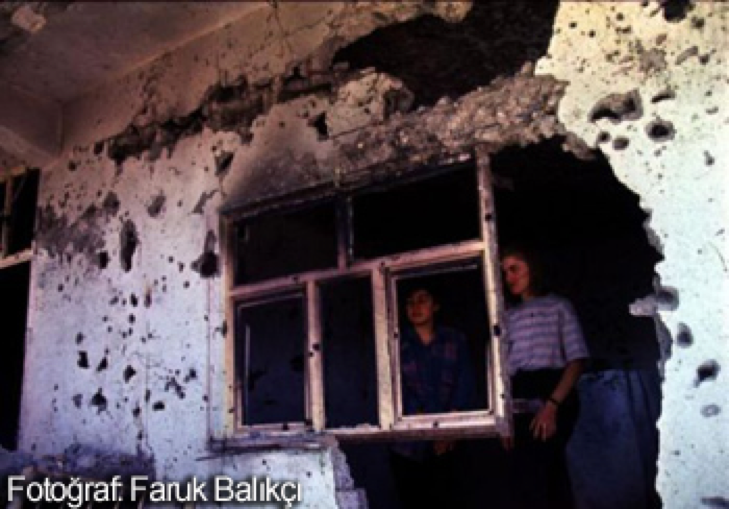
- Siz bombayı PKK’nın kullandığını söylüyorsunuz, ancak askeriyenin “PKK’lıların” diyerek ele geçirildiğini ilk kez duyurduğu silahların sayısı 16 kalaşnikoftan ibaret. (Bu sayı daha sonra artıyor/T24) Bu silahlar sizin makam odanızdaki veya diğer yapılardaki hasarı yaratabilecek güçte değil. Ayrıca, bölgede inceleme yapan HEP’lilerin raporuna göre, harap olmuş binalar arasında bulunan kovanlar da Makine Kimya Endüstrisi’ne ait çıkıyor.
Devletin ordusu mu yapmış oluyor bunu?
‘Asker de yaptı, ama PKK daha fazlasını yaptı’
- Sizin “Şırnak’ta arama da yapılmışken, bu tahribata neden olacak silahlar nerede” sorusuna yanıtınız ne?
Teröristlerin kullandığı silahlar ayrı tabii.
- Bu bilgileri sunan kişiler “katliamı askeriyenin yaptığı” iddiasını savunuyor.
Bir ara askerlerin de yaptığı oldu, ama PKK daha fazlasını yaptı.
- Buna ve resmi makamların “PKK Şırnak’ı bastı” sözlerine dair kanıtlar neler? Sizin vali olarak gözlemlediklerinizi anlatır mısınız?
PKK, bastı Şırnak’ı.
- Nasıl?
Çok bastılar ve baya sıkıntı yaşandı. Dediğim gibi, benim de makamımı bombaladılar.
- Size “Bu bombalamayı PKK yaptı” dedirten bilgi ne?
Onun nereden geldiğini bilemiyorum ama PKK yaptı.
PKK’lılar neden bulunamıyor?
- İçişleri Bakanı İsmet Sezgin, olaya dair ilk açıklamasında “1000-1500 militan baskın yaptı” diyor.
O kadar yoktu.
- Sezgin de zamanla o sayıyı aşağı çekerek 300’de duruyor. Ve ilk hamle olarak PKK’lıların güvenlik güçleri tarafından çembere alındığını söylüyor. Ama hiçbir PKK’lı bulunamıyor, neden?
Ben Şırnak’ın çevresine yol yaptırdım, PKK’lıların geçmemesi için. Bir de polislere tepeye kulübe yaptırdım. Yoksa perişan olacaklardı PKK’nın ateşleriyle.
- Sizin bu sisteminize rağmen neden hiçbir PKK’lı bulunamadı?
Şırnak çok dağlık olduğu için PKK’lıları bulmak gerçekten zordu.
- Dolayısıyla PKK’lıların ilk gün şehri terk ettiğini varsayıyorsunuz?
Onlar gece geliyorlar ve gündüz gidiyorlar.
- O zaman çatışmalar neden üç gün sürdü?
Üç gün sürdü maalesef.
- Sizin söylediklerinizden yola çıkarak şu tespiti yapmak doğru mu; “İlk gün PKK vardı. Ama ikinci ve üçüncü gün sadece asker ve sivil vardı”?
Doğru. Ama devamında hem asker, hem de PKK’lılar birbirlerini öldürmüş olabilirler.
- Ölenler arasında ne kadarlık bir kesimin PKK’lı olduğunu düşünüyorsunuz?
Bilmek çok zor.
‘Emniyet Müdürü Necati Altuntaş da yanlışlar yaptı’
- O sırada Cumhuriyet'te muhabir olan Doğan Akın haberinde, göç eden köylüler ile Emniyet Müdürü Necati Altuntaş arasında geçen diyalogu aktarıyor. Aktarıma göre, bir köylünün “İkinci gün üç Şırnaklıyı kim öldürdü” sorusunu Altuntaş “PKK ağzıyla konuşma, ayağımın altında ezdiririm seni” diyerek yanıtlıyor.
Onu da ben aldırmıştım Şırnak’a. Necati’yle polis akademisinde beraberdik. Beni aradı “Ben gelirsem şöyle yaparım” filan dedi, kimse de yoktu, bütün emniyet müdürleri bırakıp gitmişti. Ben de İçişleri Bakanı’nı aradım, “Necati’yi buraya verin” dedim. Ama ondan da memnun olmadım, acayip çok yanlışlar yaptı. Sonra “Ben bunu istemiyorum, derhal alın” dedim.
- Altuntaş da “Mete Sayar yanlışları” mı yaptı?
Ona benzer şeyleri o da yaptı.
- Sivillere mi zulmetti?
Vatandaşlarla çok iyi geçinemedi. Kendi dönemim olmasına rağmen ağır bir sicil de verdim. Sonra aldılar ve Ağrı’ya gitti, devamında da Denizli’ye. Sonra genel müdür yardımcılığı yaptı.
- Terfi mi etti?
Sicilini çok noksan vermeme rağmen terfi ettirdiler. Olacak iş değildi, çok yanlışlar yapmıştı.
- Sayar’ın ve Altuntaş’ın yanlışlarını neye yoruyorsunuz, devletçilik mi, milliyetçilik mi, yoksa durumdan vazife çıkarmak mı?
Halk adamı olmak lazım.
- Eleştirdiğiniz kişiler ne adamı veya kimin adamıydı sizce?
Bakanlıkların, Genelkurmay Başkanı’nın adamıydılar. Başka bir şey olmadılar. Ama ben hiçbir zaman ayrım yapmadan işimi yürüttüm.
‘Gazetecilerin kente girişini Mete Sayar yasakladı’
- Gazetecilerin kente girme yasağını siz mi verdiniz?
Ben vermedim.
- Kim verdi?
Yine Mete Sayar yaptı. Ben kesinlikle gazetecileri içeri sokmama gibi bir şey söylemedim.
‘Olaylar hakkında Mete Sayar’a dair şüphem var’
- Silah muamması, PKK’lıların bulunamaması, cesetlerin kime ait olduğunun belli olmaması gibi muğlâklıklar soru işaretini büyütüyor. DTP’li Hüseyin Birlik, olay için “Mete Sayar’ın bilinçli bir saldırısıydı” dedi. Sizde bu ihtimale dair şüphe var mı?
Var.
- Sizin şüphenizi besleyenler ne?
Mete Sayar çok şeyi yanlış yaptı. Halkın içine bile girmedi.
- Bu şüphenizi herhangi bir yetkiliye ilettiniz mi?
Onun kendi komutanlarıyla görüştüm. Jandarma Bölge Komutanı Necati Özgen ve Jandarma Genel Komutanı’na anlattım.
- Ne anlattınız?
Yanlışlarını.
- Açar mısınız?
O halka çok zulmetti. Halkla iç içe olmadı, yanında olmadı. Böyle olunca da biz onu desteklemedik.
- Mete Sayar halka nasıl zulmetti?
Halka büyük yanlışlıklar yaptı. O dönemi açmaya gerek yok, o ayrıldı, biz ayrıldık. Bir şey söylemeyeyim.
- 18 Ağustos 1992'de başlayan olaylara vicdanıyla da bakan, o dönem “Devlet görevlileri de insandır, mutlaka hata yapan vardır aralarında. Cezalandırılacaktır" diyerek güvenlik güçlerine dair soru işaretleri koyan tek yetkilisiniz. Bu soruya cevap verecek tek isim olarak anlatır mısınız, yanlışlar nelerdi, Şırnaklılara nasıl zulmedildi?
Söyleyecek çok şey ama boşver… Ben üzülüyorum bu konu açıldıkça.
- Susmaktansa anlatmak daha rahatlatıcı olmaz mı?
Çok şey yaşadık orada, sıkıntılar çok büyük. Kapatalım, boşver, yaptığı kendisine kaldı.
- Ancak bugüne kadar Mete Sayar bu konuda yargılanmadı, hakkında tek bir soruşturma açılmadı. Şırnaklılara verdiğiniz “Hata yapan devlet görevlileri cezalandırılacaklardır” sözünüzün gerçeklemesini sağlayacak bilgileri paylaşır mısınız?
Mete Sayar’ın gerçekten büyük yanlışlar yaptığını söylüyorum. Bu kadar yeter.
- İktidarda ana sloganı askeri vesayeti geriletmek olan bir parti varken de yapılan yanlışları anlatamaz mısınız?
Yanlışları çoktu, anlatmaya gerek yok.
- Sizi çekindiren ne?
Gerek yok diye düşünüyorum.
‘Sayar, tankları gönderirdi; yaşlıları, kız çocuklarını öldürttü’
- Köylülerin aktarımına göre Sayar, olaylardan birkaç ay önce “Ayağınızı denk alın yoksa tırpanlarım” diyor. Olaydan sonra bölgeye gelen Aziz Nesin’in de dâhil olduğu heyete “Ben burada güzel bir tablo yapmaya çalışıyorum. Bu tabloya küçük bir leke yapmaya kalkarlarsa o tabloyu Şırnaklıların başına geçiririm. Nitekim geçirdim de..." diyor.
Mete Sayar haddini aştı.
- Sayar’a ilişkin kaç vaka var aklınızda?
Mete Sayar’la hiçbir zaman anlaşamadım. Sayar, bütün işyerlerini, vatandaşın terzi dükkânlarını, her şeyini tanklarla perperişan etti. Bir de yaşlı insanlar, 70, 80 yaşındaki insanları, kız çocuklarını perişan etti. Çok büyük hatası var.
- Bu durum 18 Ağustos 1992 olaylarıyla mı sınırlı, yoksa başka vakalarda da oldu mu?
Çok yaptı. Tankları gönderirdi, hem işyerlerine, hem yaşlı insanları, hem kız çocuklarını perişan etti, öldürttü. Olacak iş değil.
- Bunlar Şırnak’ta sessiz sakin bir gün yaşanırken mi oluyordu?
Tabii. Bir giderdim, fırınlar, terziler, lokantalar kapanmış. Dışarıdan onlara ekmek getirir dağıtırdım. Terör dururken vatandaşla işin ne senin...
- Sizce Mete Sayar neyin yetkisini kullanıyordu?
Askeriyenin tabii.
‘Doğan Güreş’in de çok yanlışı oldu’
- Ağustos 1992 olayları için dönemin Genelkurmay Başkanı Doğan Güreş, Fikret Bila’ya verdiği söyleşide “Tugay Komutanı’na tanklarınla o binaları çökerteceksin dedim” ifadesini kullanıyor.
Doğan Güreş’in de bence yanlışı oldu. Mete Sayar’ı çok tuttu. Her zaman için onun yanında yer aldı, destekledi.
- Doğan Güreş’in Şırnak’taki birinci adamı mıydı Mete Sayar?
Evet. Bölge Komutanı’nı bile hiçe sayardı bazen. Necati Bey’i ben takdir ederim, dürüst bir insandır.
- 18 Ağustos 1992 katliamının ardından önlem alınsa sizce Mete Sayar’ın sivillerin öldürülmesini emretmek suçundan yargılandığı Görümlü vakası olur muydu?
Genelkurmay Başkanı OHAL Valisi’ni, Necati Bey’i desteklemedi, onu destekledi.
- Görümlü davasından sorumlu tutulanlar arasına siz Doğan Güreş’i de koyuyor musunuz?
Onu desteklediği için… Doğan Güreş hakkında bir şey söyleyemem, ama nedense ona çok destek çıktı.
Ağustos, 1992 olayında ‘Türk PKK’sı’nın rolü olabilir mi?
- Bila’yla söyleşisinde Güreş, 1991 yılında Özel Harp Dairesi’ni Özel Kuvvetler Komutanlığı’na çevirdiklerini, “Türk PKK’sı” dediği eğitim gören ilk ekibi Güneydoğu’da görevlendirdiğini söylüyor. Sizce 1992 vakasında “Türk PKK’sı”nın rolü olabilir mi?
Her şey olabilir, başka bir şey diyemem.
- Sizin Özel Kuvvetler şüphesi duyduğunuz vakalar oldu mu?
Ne diyeyim… Bilmiyorum ki. Şırnak’ta çok büyük eziyetler yaşadık.
‘Demirel askerlerin sivilleri öldürdüğünün farkındaydı’
- Emniyet Müdürü Altuntaş, Süleyman Demirel’in 18 Ağustos’tan sonra sizi aradığını söylüyor. O telefon görüşmesinde Demirel size ne dedi?
Terörle ilgili olarak aradı.
- Sivillerin askerlerce öldürüldüğünün farkında mıydı?
Farkındaydı, farkında olmaz olur mu...
‘Demirel özür dilemeli’
- Bugünden geriye baktığınızda sivillerin ölümü için “Demirel özür dilemeliydi” diyor musunuz
Dilemesi lazım, dilemesi lazımdı. Yaşlı insanları, çocukları öldürüyorsun; olacak şey değil.
- Siz, tanıklıklarınızı Demirel’e de anlatmış mıydınız mı?
Tabii.
- Ne tepki verdi?
Fazla ilgilenmedi.
‘Turgut Özal’a o bilgileri ben aktardım’
- O dönem Cumhurbaşkanı olan Turgut Özal, Şırnak olaylarından sonra MGK’yı Diyarbakır’da yapma kararı alıyor ve toplantının bir gün öncesinde Şırnak’ı ziyaret ediyor. Geldiğinde sizinle de görüştü mü?
Evet.
- Bildiklerinizi aktardınız mı?
Evet.
- Yorumu ne oldu?
Yorumunu çıkaramıyorum.
- Bir hatırlatma: Selim Sadak’ın aktarımına göre, olayda askerin rolünü sorgulayan HEP’li vekillerle görüşmesinde Özal, “Söylediklerinize inanıyorum. Terörist diye gösterilenler masum köylüler” diyor.
Dediği doğru.
- Bu bilgiyi Özal’a siz mi verdiniz?
Evet.
- Bu bilgiyi bilmesine rağmen bir Cumhurbaşkanı neden gerekli adımları atamadı?
İktidara ters düştüğü için atamadı.
- Sizce Demirel yerine Özal başbakan olsa farklı bir süreç işler miydi?
Şimdi yorum yapmak uygun değil, ikisinin de bu devlete büyük hizmetleri oldu.
18 Ağustos olayları AİHM’ye gitse…
- Şırnak’ta 26 Mart 1994’te 38 kişinin Koçağılı ve Kuşkonar köylerindeki ölümünü duyunca Ordu Valisi’yken ne düşündünüz?
Bir şey söylemek zor, bilmiyordum içeriğini.
- Bölgedeki düzeni bilen biri olarak aklınızdan ne geçti? “Bir öncekinin tekrarı” mı?
Olabilir.
- 1994 olayları hakkında AİHM, 12 Kasım’da başta Türkiye’yi yaşam hakkını ihlal etme ve yetersiz soruşturma nedeniyle mahkûm etti. 18 Ağustos olayı AİHM’nin önüne gelse, sizce Türkiye mahkûm olabilir mi? Siz AİHM yargıcı olsanız Türkiye’yi mahkûm eder miydiniz?
Olabilir.
1-
The Former Governor of Şırnak: Soldiers killed many people; I informed Ankara about this, but nobody cared!
On the 18th of August 1992, the army declared that ‘the PKK invaded Şırnak,’ and on these grounds opened fire in the town center. This situation lasted for days and resulted in an outright massacre. We asked Mustafa Malay, the then Governor of Şırnak about what took place in those days and how the soldiers treated civilians.
“18 August 1992.
I was nine years old then. Şırnak was under fire for four full days and four nights. Some homes didn’t have underground shelters. People in these kinds of houses were trying to break open their own floors using sledgehammers in order to take refuge underground to protect themselves from mortar fire, which directly targeted people’s houses.
A mortar shell had torn open part of our roof too. We were lucky that it hadn’t hit the part of the house we had gathered in. The sound it made had terrified us so that we wet ourselves. We never turned on the lights, because we feared it would make us into a target. My mother thought the urine in our beds was blood. I still remember to this very day the sound of my mother’s teeth chattering with fear and worry. Thank God my father had checked on us with a flashlight and seen what had actually happened, so that he was able to reassure our mother.
After that day, a shelter was built under almost every single home in the Şırnak center – including ours. But in those days we had no shelter or any sort of basement. So we had run over to our neighbor’s house about 100 meters away. They didn’t have a shelter either, but rather a cowshed underneath their house. We lived for four days alongside sheep and cows with a couple more families like us,” (Bianet, 19 August 2013)
This interview has a long “introduction”, which requires an ample amount of patience from the reader.
The passage quoted above belongs to attorney Ramazan Demir, one of the witnesses of the first massacre to take place in Şırnak after it officially became a province in 1991. Having begun on the 18th of August 1992, it is as of yet still unknown exactly how many people were killed during this massacre. The official statement made after the event and certain news pieces on it are, briefly, as follows:

From the newspaper Cumhuriyet, published in August with the headline “War in Şırnak”:
“The PKK launched an attack on the city center, with more than a thousand militants, using rocket launchers and mortars. The Police Headquarters, Military Headquarters, certain police forces, the gendarmerie, and some public facilities were brought under rocket and mortar fire. As reinforcement forces were brought into Şırnak from surrounding districts and provinces, war planes also took part in the operation. Entry and exit into the town was taken under control, and a curfew was put in place.”
The Minister for the Interior of the time, İsmet Sezgin:
“They sort of attempted slaughter. 1000-1500 people, fully armed… A full on uprising. (…) They are completely surrounded. There is no way for them to escape. Some of them are in houses. This is why security forces have started a series of targeted operations.”
The Prime Minister of the time, Süleyman Demirel:
“It is absolutely necessary to show utmost care to prevent women, children and innocent citizens from being caught in crossfire. All that is happening is madness, beyond anyone’s imagination. (…) The PKK shall wither away and disappear, there is no other way.”

Yet despite an offensive to the extent to which could be referred to as “war” and the full military encirclement described by the Minister for the Interior Sezgin, there was not one single PKK member caught in this operation. Moreover, numerous civilians had died despite Demirel’s speeches on “care for civilians”. The arms found in the “detailed” search conducted were limited to certain rifles (some of these being Kalashnikovs) and some guns. After the incident journalists were not allowed into Şırnak, and when they were the police “accompanied” them – as in, prevented them from photographing anything that should not be photographed or seen, or from interviewing persons who should not speak.

The inhabitants of Şırnak pointed to security forces as those responsible for what had happened in the town to journalists who were somehow able to sneak into the city, and members of Parliament from the People’s Labor Party (HEP) prepared a report upon their investigations in the area stating that the bullet casings found belonged to the official arms manufacturer of the state – namely, the Mechanical and Chemical Industry Corporation (MKE).
Despite this state of affairs nothing changed. Once more there was no court case whatsoever that inquired into the loss of human life and made those responsible pay the price.
This was followed by the murder of six civilians in the town of Görümlü, part of the Şırnak province, on the 14th of June 1993. Then, on the 26th of March 1994 38 people were killed in the Koçağılı and Kuşkonar villages of Şırnak, and 11 more people were killed in the Güçlükonak massacre, dated 15 January 1996. Cases were filed in the European Court of Human Rights (ECHR) regarding these two massacres, and Turkey was condemned.
As the army and the government, along with some military and civilian prosecutors, were trying to cover up what had happened by calling it a “PKK attack,” it turned out that the death of the 38 villagers in Koçağılı and Kuşkonar had been caused by an aerial bombardment by war planes belonging to the Turkish Air Forces. Although the Air Forces had alleged for almost 20 years that it had not launched any planes in the area, documents from the Turkish General Staff itself proved their responsibility in the affair.

So then, what was the truth behind the attack that began on the 18th of August 1992, which was to become a precursor to later massacres in Şırnak? Had this incident also been covered up by the claim that it was a “PKK attack”, just like the massacres in Kuşkonar and Koçağılı?
We were able to reach the Governor of Şırnak of the time, Mustafa Malay in order to find out what actually happened. A graduate of the Ankara University Faculty of Political Science and the Police Academy, Malay is a senior bureaucrat. Born in Malatya and having lost his father at the age of five, Malay managed to complete his education in a state of poverty. Before retiring in January 2013 from his post as Central Governor of İstanbul, he served as governor of Şırnak, Ordu, Erzurum and Aydın in turn. We asked Malay, known as “a bureaucrat close to the people,” about what happened in Şırnak in 1992. We received important answers that put on record the scope of military tutelage, ranging from local to central, from the military to civilian government. Here they are…
‘In Şırnak, soldiers have never once taken a cigarette from the people, or eaten a meal at their table.’
- As someone who has served this state for the past 40 years…
47 years to be exact. I started as a police officer. Then I became a commissary. After working in the police forces I first became a district governor (or sub-governor), then I went back to working for the police. In the 1980’s I served as chief of intelligence and head of the branch for politically motivated crimes in İstanbul. Then I went back to my former profession and became an inspector. I worked as an inspector for 9 years, before going abroad and staying there for 6 months. My first post as governor was in the years 1991 to 1993 in Şırnak.
- Şırnak had just become a province.
And it was a tumultuous time. But I never discriminated between citizens. Our citizens appreciated us, and we appreciated them. Whenever I visit they still welcome me quite warmly. After that, I served as governor of Ordu, Erzurum and Aydın. And finally I was head of the group of central governors of İstanbul. Then I retired due to my age.
'I kind of unsettled the soldiers a bit'
- We are curious about your experience of military tutelage in your 47 years of serving as police and local authority. Especially with regards to your experience in Şırnak, a symbolic province in the 1990s, you say in a visit to the area years later that in your day as a governor, “this place was in turmoil. Both in terms of security, and in terms of the citizens’ conditions.” In your words, “Our citizens were suffering extensively.” What role did military tutelage play in this suffering?
The soldiers would not really mingle with the people. I never saw officers or petty officers spend time in public, say hi to people or talk to them. So, in this sense, I kind of unsettled them a bit. I told them to spend time with the people of the town, rub elbows with them. None of them had once taken a cigarette from the people, or eaten a meal at their table. They had just kept to themselves. But I was constantly close to the people. I would go everywhere, spend time in their midst.
‘In 1993 a whole farewell convoy escorted me to the province’s boundary with Mardin’
- Is this why you became a name that the people of Şırnak remember well even in such horrific times?
They used to tell us, “Don’t dare revisit any place you worked in as a governor or sub-governor.” When anyone asked why, they would say “The citizens may turn their backs on you, making you miserable. Don’t go anywhere you ever held a post in.” I did the exact opposite. I revisited every single place I worked in as governor. I still go to Şırnak... After Şırnak they pulled me to the center, and I went there willingly. (Central Governorship is known as “shelf duty”- or a passive job/T24). While I was preparing to leave for the center an administrator called me and said, “Governor, Sir, the people have gathered here. They are waiting for you.” I told him to tell them that I would come in a bit, but that they should definitely not come to escort me. So I went there and made a short speech, saying: “I wish I could have better served you; but nonetheless it is clear that you are pleased with the services I have provided. And so am I. Now the time has come for me to leave.” In those days, people weren’t even able to visit their relatives out of fear.
But that day, a whole lot of people came there and I bid them farewell. I insisted, “I am going to go over to Cizre now, promise me that you won’t follow me.” But as I was on the way I glanced behind and saw a whole convoy of tractors, trucks and cars following me. I felt sorry and stopped, got off and told them that it was OK, it was enough, they could go back. They didn’t. They followed me all the way to the boundary with Mardin; that huge convoy escorted me 200 kilometers in order to see me off. Seeing something of this sort is enough you know. It is satisfactory enough. Some lawyers even said, (against the appointment to the center/T24) “We’ll open a lawsuit for you.” I said, “No my friends, I don’t want this kind of thing.”
- Was it your wish to leave Şırnak?
I never asked or wished to go anywhere. I went wherever they decided for me to go. They appointed me, and I went.
‘Each and every government manages to surpass the other and take the first place in terms of making mistakes’
- Your Governorship of Şırnak lasted for a quite short period. Why do you think you were appointed elsewhere so fast while you had such good relations with the people?
I believe I held my post for about a year and a half or two years. As I said, the people liked me, and I liked them.
- Was it the government that didn’t like you then?
I’ve never been able to get along with any government any way. They’re all in the wrong; in fact, each and every government manages to take the first place in terms of making mistakes. I have never seen any government do what’s right.
- Certain people, in possession of relatively current information, might argue against what you say here by reminding you that when the AKP was organizing a rally in Aydın, you sent written orders as governor to administrators demanding their participation.
This is outright false. There were no written orders whatsoever. A rally was indeed held there, and I sent no state officials or civil servants – I would do no such thing. Why would I? I myself didn’t attend the rally. Later on, there was an opening ceremony somewhere else, and some state officials had to go in order to give some information. But coming back to the rally, I neither went nor sent anyone else. What’s a state official’s job in a rally? How would any state official discriminate between citizens in this manner? I served during the regimes of all types of government, yet I never saw any single one that got it right. They all made mistakes.
- Like what?
Everything they do is wrong. They prefer their own people for many positions. They give them rights they shouldn’t give. This is not how it should be done.
- Did Süleyman Demirel’s government put their own man in your place after removing you from Şırnak?
I don’t know who they sent after me.
‘I can never forget how two young girls were massacred in Şırnak’
- In your time the first of the incidents that were to become symbolic for Şırnak occurred. On the 18th of August 1992 clashes that were to last 3 days according to some and 4 days according to others began. And these resulted in a massacre.
Yes, there were great massacres.
- What happened that day and in its wake?
That day there was great trouble in both Cizre and in the Şırnak center. Many people were killed. I’ll never forget them. There were two young girls that were massacred, raked by machine gun fire. Their plight struck me the most.
- Who shot them?
Terrorists, sadly.
‘Soldiers opened fire on citizens’ houses’
- Is this the first time this kind of thing happened?
It happened late at night. I still cannot forget… Well the army too would operate not during the day, but at night. They would open fire on citizens’ stuff. They also acted quite wrongly.
- So soldiers shot at civilian homes, is that true?
Yes, of course it is. They destroyed houses, broke their windows and all, ruined these places, damaged everything. This made me very angry too.
- In the newspapers of that era two disparate views emerge. The army and the Demirel Government says that “the PKK started the attack, and soldiers merely responded,” while villagers, Kurdish politicians and the limited number of journalists who were able sneak in point to security forces as those responsible for what happened. You, on the other hand, are quite careful in the statements you make. How did this whole affair begin, and how did it continue?
These are tough issues, I’m afraid I won’t be able to say anything about this.
- Is there anything preventing you today from speaking about this huge black hole, which you say you are unable to forget?
In that era of terror only the courthouse remained, and me in the post of governor. All state officials, civil servants fell apart and left. There’s a lot to say about what happened after, but let’s not get into that.
- Why do you choose not to tell?
I just think I shouldn’t say anything anymore, let the state do whatever it wishes to do.
‘The military has greater responsibility in the misery of the people’
- In those days villagers spoke out, but it wasn’t heard. You chose to refrain from commenting on critical issues. Both due to your careful attitude at the time, and to the fact that you are now retired, you are the one and only person who can tell us what actually happened in those days. Is it not possible for Mustafa Malay to recount today what happened then?
There is an 82-year old writer, who is writing a book on my life. This writer went to the region and conducted research on me. This 400-page-long book shall be out in a couple months. I’ve recounted a lot in that book.
- What if you considered this interview as an introduction to the book and shared with us this portion of what you recounted there?
It’s better if you read it in the book.
- Then let me ask you one by one: there are some sources that say that 54 people were killed as a result of the massacre that began on the 18th of August, while other sources say these numbered 116. How many people died, according to the information you were able to gain?
A lot of people died. Far too numerous to be counted.
‘The army killed elderly people and even children’
- Well is the number of the deceased closer to 54 or to 116? Do you have any data on this?
It’s really not possible for me to say right now. But both members of our police forces and our soldiers were martyred, terrorists were killed. The people of Şırnak were also brought to ruin. With regards to this, I believe the military carries greater responsibility. Because soldiers would traipse in, tear down citizens’ workplaces, destroy their stuff and leave. What’s more is elderly people and youngsters were killed. Soldiers also killed many people, unfortunately.
- Did soldiers open fire upon houses without considering whether there were civilians inside or not?
Sure, without checking if there were civilians or not… Sadly, much was wrong about what the army did here. They killed elderly people and even children. I believe they are also at fault. I had many conversations with them about this, and we had a bit of a falling out. I told them, “Why are you killing these people, go kill terrorists instead.” Why would you kill these children, these people with disabilities while terrorists are out there?
'I told them to stop dealing with the elderly and with children, and go find and kill terrorists instead'
- What was their response?
They had no response of course. I said, “You are killing disabled and elderly people, and children. Go ahead, search for terrorists and find them. Kill these terrorists instead.” But no… Unfortunately the army made many mistakes.
- Did you have this conversation with Brigadier General Mete Sayar, the then Commander of the Şırnak Brigade?
Yes. He is now paying the price.
- Where?
I don’t know.
‘I said this next to Ünal Erkan and Necati Özgen as well…’
- Sayar is now on trial in the Görümlü case, but he hasn’t appeared yet. In August 1992, as a governor you ask a brigadier general why they are killing civilians instead of terrorists. Did this have no force whatsoever?
Ünal Erkan, the State of Emergency (OHAL) Regional Governor, came. So did Mr. Necati Özgen (the Gendarmerie Public Security Diyarbakır Regional Commander of the time). I repeated this in their presence. I said, “You go around and wreak havoc all over.” And then he told me, “I stopped, and look now they are attacking.” Mete Sayar made a lot of mistakes. You should never harm the people. You should go and kill terrorists. Nobody would say anything if you just killed terrorists.
As I said, disabled kids and elderly people suffered. There weren’t many teachers for instance, and the ones that existed used to stay in teacher’s lodges, living in miserable conditions. We visited people’s homes, and told them to take these teachers in, host them so that they could give lessons to their children. This had positive effects; or else they really weren’t able to succeed in the exams. From then on, in times of conflict or during armed clashes they would take these teachers in and host them in their homes.
- How did Ünal Erkan and Necati Özgen react to this outburst of yours?
They didn’t really have much to do with it.
- In an interview by Fikret Bila with Necati Özgen years after the incident he describes those days, saying “We transferred both Governor Mustafa Malay and Chief of Police Necati Altuntaş into the brigade barracks because nowhere was safe. It appeared that there was a full on uprising.”
No, I didn’t go there.
- Where were you?
I was always in office. When Necati Özgen or the General Commander of the Gendarmerie (Eşref Bitlis) came I would go meet with them and return to my office. In fact, as I was sitting in office in the middle of the night they shot fireworks – what terrorists call bombs. God protected me. I was alone, and they completely destroyed two rooms. Thank God nothing happened to the part I was in.

You say the PKK used these bombs, but the arms that the military declared they had confiscated on grounds that these belonged to the PKK were a mere 16 Kalashnikovs. (This number later increases/T24) These weapons are not potent enough to have caused the damage in your office or in other buildings. Furthermore, according to the report by the People’s Labor Party (HEP) on their observations in the region, the bullet casings found among damaged and destroyed buildings turn out to be belonging to the Mechanical and Chemical Industry Corporation.
So is it the State’s army that did all of this?
‘The army did certain things, but the PKK did a lot more’
- What is your answer to where the weapons that could have caused this kind of destruction may be since they weren’t found in the careful search conducted throughout Şırnak?
The arms used by terrorists are separate, of course.
- Those who provide this information allege that the military was responsible for this massacre.
Well, at one point the army did do this kind of thing, but the PKK did a lot more.
- What is the proof to this and to official claims that “the PKK invaded Şırnak”? Could you tell us your observations as a governor?
The PKK did invade Şırnak.
- How?
Intensely, and this caused much trouble. As I said, they bombed my office as well.
- What kind of information makes you say that “the PKK was responsible for this bombing”?
I don’t know where this information comes from, but the PKK did it.
Why can’t these PKK members be found?
- Minister for the Interior İsmet Sezgin stated in his initial declaration regarding the incident that “1000-1500 militants were involved in the attack.”
There weren’t that many.
- In time Sezgin also cuts this number down, and comes all the way to 300. He also announces that as their first move, security forces immediately surrounded the PKK members. But not one PKK member was found. Why?
I had a road constructed around Şırnak, to prevent PKK members from crossing in and out. I also had a shack built for police forces on top of the surrounding hills. Or else they would have been ravaged by PKK fire.
- Despite this system of yours why were no PKK members found?
Finding PKK members was really tough because of how mountainous Şırnak is.
- So you assume that these PKK members left the city in that very first day?
They come in during the night and leave in the morning.
- Then why did the clashes last three whole days?
Sadly they lasted for three days, yes.
- Is it possible to reach this conclusion from what you say: “The first day the PKK was present. But the second and third day there were only soldiers and civilians”?
True. But in the following days both soldiers and PKK members may have killed each other.
- What portion of those who died do you believe to be members of the PKK?
This is quite hard to tell.
‘Chief of Police Necati Altuntaş made many mistakes too’
- Reporter for Cumhuriyet at the time, Doğan Akın, relays a dialogue between migrating villagers and Chief of Police Necati Altuntaş in a news piece he wrote. According to this, a villager asks who killed three inhabitants of Şırnak on the second day, and Altıntaş’s response is “Don’t dare speak like a PKK member with me, I’ll crush you right here!”
It was I who had him appointed to Şırnak too, you know. We had attended the police academy together. He called me and started telling me about everything he would do if he were there. There was no one around at the time; each and every chief of police had abandoned the place and gone. So I called the Minister for the Interior and asked him to send Necati over. But I wasn’t satisfied with him either; he made way too many mistakes. So later I said, “I don’t want him, remove him immediately.”
- Were Altuntaş’s mistakes similar to those of Mete Sayar?
He did similar things, yes.
- Did he oppress civilians?
He didn’t get along very well with our citizens. Even though he was my own class mate I gave him a bad record too. Later they removed him from that duty, and he went to Ağrı and then Denizli. Then he served as deputy director general.
- So he was promoted?
They promoted him even though many shortcomings were listed in the record I gave him. It was really unacceptable. He had made way too many mistakes.
- What do you think was the root cause of Sayar’s and Altuntaş’s mistakes or wrongdoings? Was it etatism or nationalism or simply the tendency to overstep the bounds of their duties?
One must be a man of the people.
- ‘Whose’ men or what kind of men do you think these people you criticize were?
They belonged to Ministries or to the Commander of the Armed Forces. They were never anything else. But I did my job without ever discriminating between anyone.
‘It was Mete Sayar who banned journalists’ entry into the town’
- Was it you who enacted the ban against journalists’ entry into the town?
No, it wasn’t.
- Who was it then?
It was Mete Sayar, yet again. I definitely never said anything about preventing journalists from entering.
‘I have certain suspicions regarding Mete Sayar’s role in these incidents’
- The enigma regarding the weapons used, the fact that these PKK members were never found, the ambiguity regarding the identities of corpses all give rise to many question marks. Hüseyin Birlik from the Democratic Society Party (DTP) said that “This was a deliberate attack organized by Mete Sayar.” Do you have any suspicions of this sort?
I do.
- What feeds these suspicions of yours?
Mete Sayar did many wrong things. He never even mingled with the people.
- Did you convey these suspicions of yours to anybody in charge?
I spoke with his commanders. I told the Gendarmerie Regional Commander Necati Özgen and the General Commander of the Gendarmerie.
- What did you tell them?
About his mistakes, his wrongdoings.
- Would you care to elaborate?
He oppressed the people, persecuted them. He never mingled with people, or stood by their side. Things being this way, I refused to support him further.
- How did Mete Sayar persecute the people?
He committed many wrongful acts against them. There’s no need to rake up the past now, he left, we left. I won’t say more.
- You are the only state official who approached the incidents that began on the 18th of August 1992 with conscience, who had questions and doubts regarding security forces as well, saying “State officials are also human, and there are surely those among them that make mistakes. These shall be punished.” As the one and only person who can respond to this question could you please tell us what these mistakes were. How were the people of Şırnak oppressed and persecuted?
There is a lot to say, but never mind… Even just talking about it saddens me.
- Wouldn’t recounting what happened be more relieving than remaining silent?
We went through a lot there. There was a lot of trouble. Let’s drop the subject, never mind, the burden of what he did will remain with him.
- But Mete Sayar hasn’t yet been tried in court about this; there has been no investigation to his name. Wouldn’t you share the information required to help make true your promise to the people of Şırnak that “State officials who make mistakes shall be punished”?
I repeat that Mete Sayar really committed great wrongs. I think this is enough.
- Can’t you tell us what these wrongdoings were even when there’s a party in power whose main slogan is ending military tutelage in Turkey?
They were many, there’s no need to tell.
- What makes you hold back?
I just think there’s no need.
‘Sayar would send in tanks. He had elderly people and children killed’
- According to villagers’ statements a couple months before the events Sayar is heard saying, “Watch what you do, or else you’ll pay the price”. Later on, he tells a delegation including Aziz Nesin, visiting the region after the incident: “I’m trying my best to create a nice picture here. If they try to smear it even slightly I’d bring that entire picture to ruins around them. And as a matter of fact I did…”
Mete Sayar went too far, overstepped his bounds.
- How many examples of Sayar’s similar actions come to your mind?
I never got along with Mete Sayar. Sayar ruined all the workplaces, folks’ tailor shops, everything they had, using tanks. He hurt elderly people, aged 70 or 80, and young girls. His wrongdoings are just too great.
- Is this limited to the incidents surrounding the 18th of August 1992, or were there other cases?
There were many. He would send tanks to destroy workplaces, and he made elderly people as well as young girls suffer. He had them killed. Completely unacceptable.
- Would he do these kinds of things out of nowhere, during a calm and quite day in Şırnak?
Sure. I would go to find bakeries, tailor shops, restaurants all shut down. I would bring in bread from outside and distribute it. What business do you have messing with citizens when you should be dealing with terror…
- Whose authority do you think Mete Sayar was acting on?
The military of course.
‘Doğan Güreş did many wrong things too’
- In an interview by Fikret Bila with the then Chief of the General Staff of Turkey Doğan Güreş regarding the incidents of August 1992, Güreş says “I told the Brigade Commander to tear those buildings down with his tanks.”
I think that Doğan Güreş did many wrong things too. He greatly favoured Mete Sayar. Always stood by his side, always supported him.
- Was Mete Sayar Doğan Güreş’s chief man in Şırnak?
Yes. He would sometimes even disregard the Regional Commander. I appreciate Mr. Necati, he’s an honest man.
- Do you think that if the necessary precautions were taken after the massacre of the 18th of August 1992, the Görümlü case in which Mete Sayar is being tried for having ordered the death of civilians would have ever taken place?
The Chief of the General Staff didn’t support the OHAL (State of Emergency) Governor or Mr. Necati. He supported Sayar.
- Do you think Doğan Güreş is among those responsible for the Görümlü case?
For supporting him… I can’t say much about Doğan Güreş, but for some reason he really supported Sayar.
Could the ‘Turkish PKK’ have played a role in the incident of August 1992?
- In his interview with Bila, Güreş says that they transformed the Office of Special Warfare into the Special Forces Command in 1991, and he assigned the first team they trained, which he calls “the Turkish PKK”, to duty in the Southeast. Do you think “the Turkish PKK” could have played a role in the events of 1992?
Everything is possible, I can’t say more.
- Were there incidents where you suspected the involvement of the Special Forces?
What can I say… I don’t know. We were made to suffer so much in Şırnak.
‘Demirel was aware that soldiers were killing civilians’
- Chief of Police Altuntaş says that after the 18th of August Süleyman Demirel called you. What did Demirel tell you in that phone conversation?
He called me to talk about terror.
- Was he aware that civilians were being killed by soldiers?
Sure he was, how could he not be...
‘Demirel should apologize’
- Looking back now, do you say that Demirel should apologize for the death of civilians?
He should; well, he should have apologized. You go around killing elderly people and children – that’s unacceptable.
- Did you tell Demirel about everything you had witnessed, about your experiences?
Sure.
- What was his reaction?
He wasn’t very interested.
‘I personally delivered this information to Turgut Özal.’
- The then President Turgut Özal decides to conduct the National Security Council meeting in Diyarbakır after the incidents in Şırnak, and visits Şırnak a day before the meeting. Did he meet with you when he came?
Yes.
- Did you tell him everything you knew?
Yes.
- How did he interpret what you said?
I can’t seem to remember.
- Well, a small reminder then: According to what Selim Sadak says, in a meeting with members of Parliament from the People’s Labor Party (HEP) who were investigating into the role of the military in the incident, Özal said: “I believe what you tell me. Those portrayed as terrorists are indeed innocent villagers.”
What he says is right.
- Were you the one to give Özal this information?
Yes.
- Why was someone as high up as the President unable to take the necessary steps even though he had this kind of information?
He couldn’t, because he was at odds with the government.
- Do you think if Özal were Prime Minister instead of Demirel, the ensuing process would have been different?
It wouldn’t be proper to comment on this right now. Both of them did great services to this country.
If the incident of the 18th of August were to be carried to the European Court of Human Rights…
- When you heard about the death of 38 people in the villages of Koçağılı and Kuşkonar in Şırnak on the 26th of March 1994 as you were Governor of Ordu, what did you think?
It’s hard to say. I didn’t know what happened.
- As someone who knew the way things worked in the region, what came to your mind? Did you think this could be a repetition of what happened before?
Possibly.
- The ECHR condemned Turkey on the 12th of November regarding the events of 1994 primarily on grounds of violating the right to life and inadequate investigation. Do you believe that Turkey would receive a sentence if what happened on August the 18th were to be carried to the ECHR? If you were a judge in the European Court of Human Rights would you condemn Turkey?
Possibly.
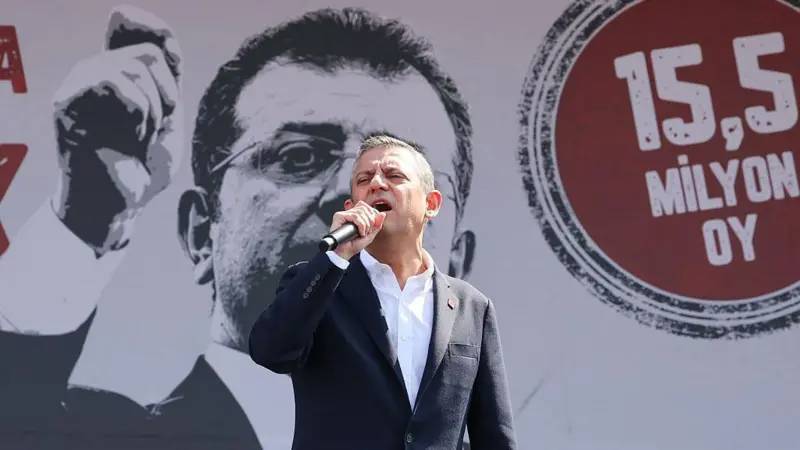
CHP 21. Olağanüstü Kurultayı 'İrade milletindir' sloganıyla toplanıyor: Özgür Özel ve iki isim yarışacak; 'Gölge kabine'ye İmamoğlu revizyonu
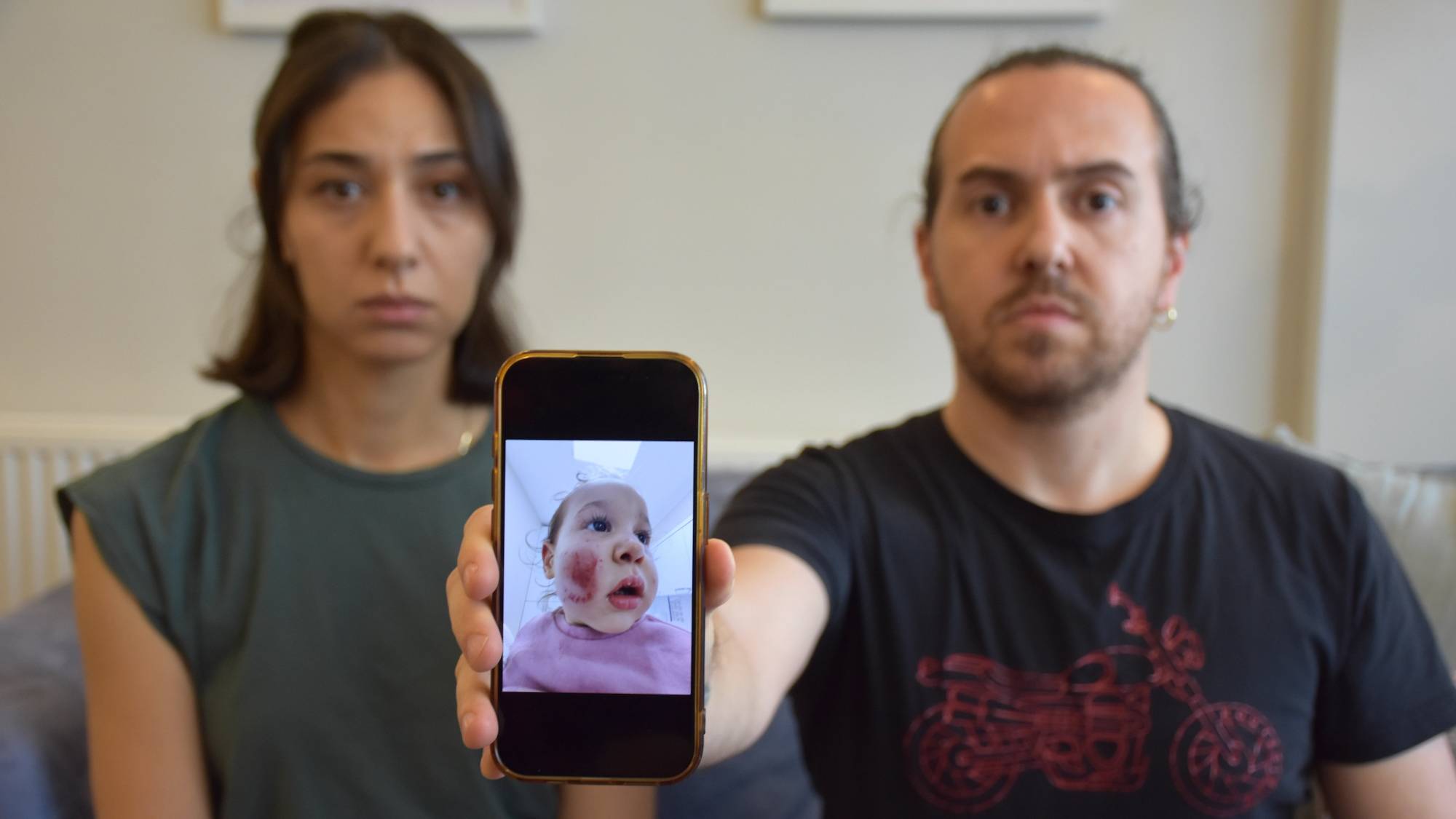
Kreşte akran zorbalığı: 2 yaşındaki bebek darbedildi
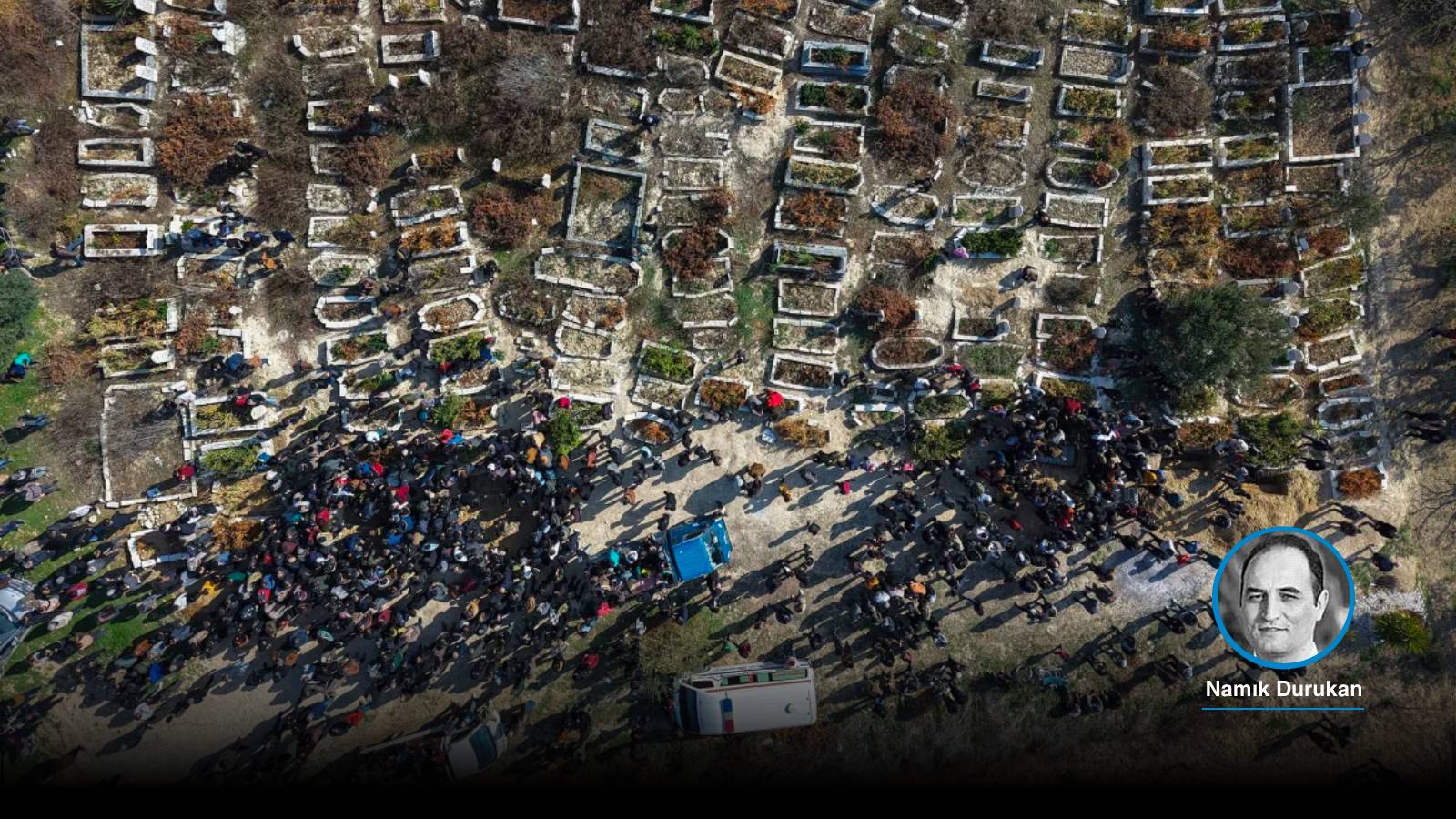
Alevilere yönelik saldırıları "toplu katliam" olarak nitelendiren Uluslararası Af Örgütü, Şam'ı sorumlu tuttu; Şam, Alevi katliamını kabul etti
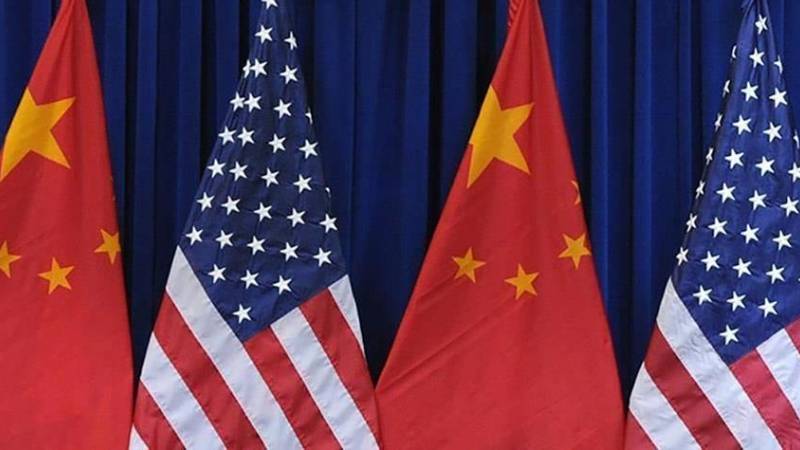
Çin'in misillemeleri sürüyor; nadir toprak elementlerinin ihracatına kısıtlama, ABD şirketlerine yaptırım
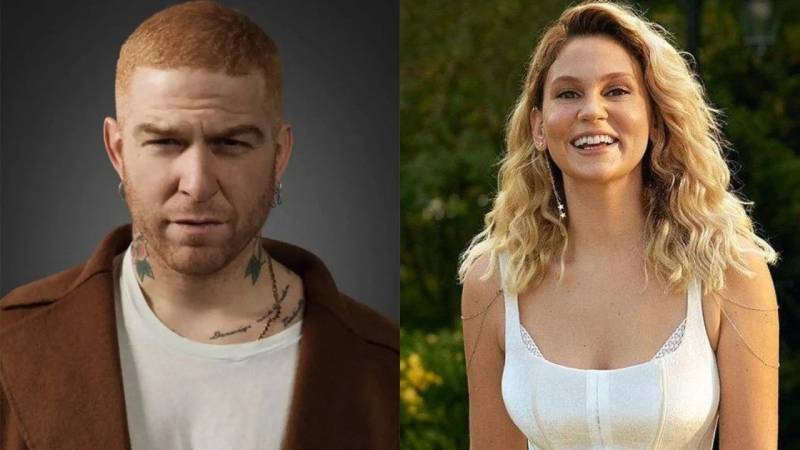
Gökhan Özoğuz'dan Farah Zeynep Abdullah açıklaması

© Tüm hakları saklıdır.
Yazarlar
- Adnan Ekinci
- Ahmet Sever
- Ahmet Talimciler
- Akdoğan Özkan
- Alex Akimoğlu
- Ali Akay
- Atilla Dorsay
- Aydın Engin
- Ayfer Feriha Nujen
- Aysel Sağır
- Ayşe Acar
- Barçın Yinanç
- Bekir Ağırdır
- Candan Yıldız
- Cemal Tunçdemir
- Çağnur Öztürk
- Çiğdem Anad
- Çiğdem Toker
- Deniz Can
- Doğan Akın
- Emrah Akın
- Ercan Uygur
- Erdoğan İşcan
- Erdoğan Sağlam
- Faruk Bildirici
- Fulya Canşen
- Füsun Sarp Nebil
- Gökçer Tahincioğlu
- Gönenç Gürkaynak
- Hakan Aksay
- Hande Çayır
- Hasan Cemal
- Hasan Göğüş
- Hasan Servet Öktem
- İrfan Yalın
- İskender Aruoba
- Leyla Alp
- M. K. Perker
- Mehmet Y. Yılmaz
- Mehmet Y. Yılmaz | Futbol
- Mehmet Y. Yılmaz | Hafta Sonu
- Mehmet Yalçın
- Murat Batı
- Murat Belge
- Murat Bjeduğ
- Murat Sabuncu
- Mustafa Durmuş
- Oğuz Demiralp
- Orhan Tekelioğlu
- Oya Baydar
- Pınar Doğu
- Rıdvan Akar
- Rıza Türmen
- Selçuk Demirel
- Sencer Ayata
- Seyfettin Gürsel
- Süheyl Aygül
- Şenay Tanrıvermiş
- Şengün Kılıç
- Şirin Payzın
- Şükrü Hatun
- Talat Kırış
- Tan Oral
- Tolga Şardan
- Tolga Şirin
- Tuğçe Tatari
- Tuğrul Akşar
- Tuğrul Eryılmaz
- Türkay Demir
- Uğur Gürses
- Umut Ozan Darıcı
- Yalçın Doğan
- Yılmaz Murat Bilican
- Yusuf Nazım
- Zeynel Lüle


